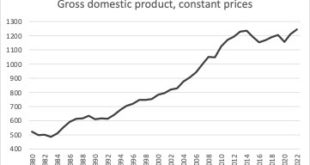New paper on the empirical evidence of the relevance of the supermultiplier for explaining economic cycles by Ricardo Summa, Gabriel Petrini, and Lucas Teixeira. From the abstract:The demand-led supermultiplier growth model proposes that business investment is induced by income while autonomous expenditures determine economic growth. The most known versions of the model are presented at high levels of abstraction, focusing on general analytical properties and dynamic stability conditions....
Read More »Kalecki’s alternative to Keynes and White and its consequences
[embedded content] Partial video (my fault) of the conference about the book edited by the late Jerzy Osiatynski and by Jan Toporowski published by Oxford University Press. Our chapter on Prebisch with Esteban Pérez is available in a preliminary version here.
Read More »Public vs private debt
I was teaching about deficits and debt this last week. If you know me and follow this blog, you'd know that I always emphasize the importance of the distinction between debt in domestic currency and debt in foreign currency. Functional finance authors (and MMT too) are correct in noting that a country cannot default on debt in its own currency (for a model of a currency crisis and default, in foreign currency go here; as afar as I know the only formalization of a PK alternative to the...
Read More »Kalecki’s Alternative to Keynes and White’s Plans its Consequences
Webinar on Kalecki and his views on the Bretton Woods agreement. To register go here.
Read More »Savings Glut, Secular Stagnation, Demographic Reversal, and Inequality: Beyond Conventional Explanations of Lower Interest Rates
New Working Paper published by the Political Economy Research Institute (PERI). From the abstract:Interest rates have declined over the last 40 years, a period of increasing inequality. The steady decline in interest rates has been interpreted by and large as resulting from a decline of the natural rate of interest. This paper surveys the main explanations associated with the notion of a decline in the natural rate of interest, including the savings glut and the secular stagnation...
Read More »Lula’s election and what lies ahead
It's been a while since I wrote about the Brazilian crisis (a summary of the previous catastrophic election here). In part that election and the continued crisis explains why I have written less, not just about Brazil. This has been a long economic depression that started in 2015 (see graph), with a coup in 2016 and since 2018 the added problem of a right-wing authoritarian regime that won an election that was only possible with the political proscription of Lula. But at least the political...
Read More »Comments on the history of the Review of Keynesian Economics on its tenth anniversary
By Thomas Palley This Fall (October/November 2022) marks the tenth anniversary of the founding of the Review of Keynesian Economics (ROKE). The founding co-editors were Louis-Philippe Rochon, Matias Vernengo, and I. At the beginning of 2018 Louis-Philippe Rochon stepped down to become sole editor of the Review of Political Economy and he was replaced by Esteban Pérez Caldentey.Since then, ROKE has further enhanced its reputation, becoming a leading heterodox economics journal as measured by...
Read More »Palley on the history of the Review of Keynesian Economics
Here a short video. I do offer a few remarks. I would add that Louis-Philippe was central not just in the initial discussions that we had going back two decades now, to when we were at Kalamazoo College, but in getting Elgar into the journal business. Not sure Elgar would have done that without LP convincing them. This happened at the time that the JPKE was transitioning from Paul Davidson editorship, to the Jan Kregel and Randy Wray period. [embedded content]I suggested Tom to LP, since he...
Read More »Some thoughts on radical environmentalism and heterodox economics
Ecological economics emerged in the 1970s, as a sub-field of mainstream economics, using some of the conventional tools of neoclassical economics, but trying to move away from it, not only regarding some of the theoretical choices, but also distancing from some of the ethical concerns of the mainstream (Holt and Spash, 2009). Even though there were precursors to ecological economics, in particular the work of Kenneth Boulding, Nicholas Georgescu-Roegen and Karl William Kapp, it is clear that...
Read More »Peter Temin on “Keynes, Then and Now”
This will be part of the 10 year anniversary of ROKE. Register here.
Read More » Naked Keynesianism
Naked Keynesianism

-310x165.png)
-310x165.png)


